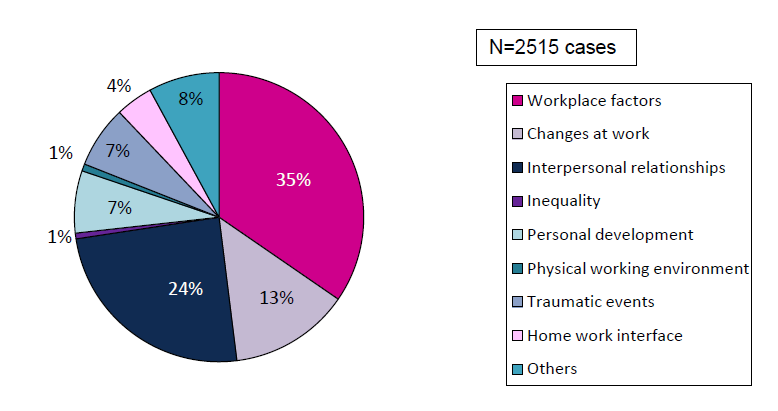Bullying and harassment - evidence it accounts for sickness absence
Learning & Development 1st October 2014
For years, I’ve sought data on how much sickness absence is caused by workplace conflict. I know that conflict makes people go off sick with stress – but how could I prove this?
So I was jubilant when I found data from THOR – and my thanks are given to Louise Hussey of the THOR research team for providing the source data for this blog.
The Health and Occupation Research network (THOR) is a research and information dissemination programme on the incidence and health burden of occupational disease and work-related ill-health. Data is collected from a research network of over 2000 specialist physicians and specially trained General Practitioners throughout the UK. It was from these GPs that this data comes from.
Mental ill health is a big problem at work
A third of cases of workplace illness recorded by GPs over a six-year period were of mental ill-health attributed to work place stressors. And GPs are more likely to give a sick note for this type of ill health, than for any other.
Figure 1: Proportion of total days certified by diagnostic category, over 6 years

And if you’re off sick with mental ill-health, you’re likely to be off for longer – with a mean number of days per absence of over 24 days. Combine incidences of mental ill health with length of absence, and work-related mental ill-health makes up more than half the number of sickness absence days that are absence certified by a doctor.
But we need to drill further to see where bullying and harassment and conflict come into the picture.
When a GP reports a case to THOR they attribute a workplace stressor(s) to their diagnosis, e.g. workload, conflict with management, threat of redundancy. These are coded into nine major categories (shown in the table below).
Interpersonal relationships are the second most common underlying source of mental ill-health
Almost a quarter of mental ill-health sickness absence relates to interpersonal relationships as Figure 2 shows.
Figure 2: Proportion of work-related mental ill-health by attributed event/stressor

Close, but no cigar. I needed more.
I asked the ever-helpful Louise to break down the category of ‘interpersonal relationships’ further and she was able to interrogate the date to come up with these groupings:
- Interpersonal difficulties with your manager
- Interpersonal difficulties with other workers
- Interpersonal difficulties with patients/clients/pupils
- Bullying or harassment
- Other
And low and behold.
These two categories are more likely on average to have staff off for longer periods of time – 26 days, or more than a working month. And 10 per cent of people off with mental ill-health are off because of bullying: this is 8055 days over 2006-2012, or an average of 1342 per year (41% of the 24% of interpersonal relationships. i.e. 9.84% of all mental health issues at work).
Figure 3: Proportion of work-related mental ill-health cases attributed to interpersonal difficulties

So when you are thinking about how to manage your sickness absence levels, think: many people are off, for longer, with mental ill-health, and underlying that are problems with interpersonal relationships: and underlying that is bullying and harassment, and difficult bosses.
So train your managers not just to manage sickness absence, but to minimize their role in it. Give them the skills to manage performance in such a way that they sustain and strengthen their relationship with their staff, as well as achieving the task. Make sure no one inadvertently bullies or harasses, out of ignorance or a lack of skill. Offer conflict coaching, mediation and harassment advisors, rather than counselling, to get people back from sick leave.
And attend our Mediation and Mental Health course in London on 18 November, if you’re a mediator, asked to mediate cases of ‘return to work’ mediations.
Source of data from The Health and Occupation Research network (THOR), data request no: 2013-01-THOR-GP, Centre for Occupational and Environmental Health, University of Manchester